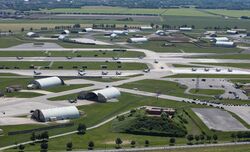Cardoso Royal Air Force Base
| Cardoso Royal Air Force Base | |||||||||
|---|---|---|---|---|---|---|---|---|---|
Near Corgeno, Notteri | |||||||||
 | |||||||||
| Site information | |||||||||
| Owner | Ministry of Defense | ||||||||
| Operator | Lumenic Air Force | ||||||||
| Condition | Operational | ||||||||
| Site history | |||||||||
| Built | 1916 | ||||||||
| In use | 1916 - present | ||||||||
| Garrison information | |||||||||
| Current commander | Tenente generale Mattia Puricelli | ||||||||
| Garrison | 32° Stormo | ||||||||
| Occupants |
| ||||||||
| Airfield information | |||||||||
| |||||||||
Cardoso Royal Air Force Base is an air base located in eastern Luminerra operated by the Lumenic Air Force. Located in the Notteri region, the base is 15 kilometres (9.3 mi) from the nearest town, Corgeno.
Prior to the establishment of the Lumenic Air Force in 1923, Cardoso Royal Air Force Base was controlled by the Lumenic Army Flying Corps, and was known as Cardoso Army Airfield. The Lumenic Air Force has operated and controlled the base since assuming ownership in 1923, excepting a brief period in 1973 when the base was overrun by Soivet Order forces and used by the Soviet Order Air Force during the invasion of Luminerra. Today, it is home to the 32° Stormo, and has hosted many foreign aircraft during its history. The 32° Stormo is the only fighter wing located in eastern mainland Luminerra, and this makes the wing critical to operations in Luminerra's eastern sector, including operations over Mare Ventis and the Valoric Islands
History
Cardoso Army Airfield was the first military aviation facility constructed in Luminerra, having been built in 1916. When the Lumenic Air Force was established in 1923, owneership of the base was transferred from the Lumenic Army to the newly established Lumenic Air Force. The 32° Stormo was chosen as the garrison unit for the base, establishing itself there in early 1924. The 32° Stormo has held stewardship of the base since that time.
During the 1950's and early 1960's, with the threat of Soviet invasion looming, the government of Luminerra began a massive project to expand the nation's military infrastructure, part of this plan being to expand air bases to increase their operating capacity. Cardoso Royal Air Force Base, being situated on the costal plains of southern Notteri, was in a unique situation; being far enough away from the border that it was not anticipated an invading force could penetrate to its location rapidly, but was situated close enough to support the projected location of the Ultima Castellum; the final redoubt of defensive positions being constructed along both slopes of the Vi Castis Mountains along the nation's northern border. To this end, the base was greatly expanded, allowing it to accommodate two full wings of aircraft, a total of 144 aircraft. Further temporary space was constructed to allow the base to facilitate the operation of transient aircraft, or temporarily house other squadrons for operations. Further, the bases main runway was lengthened from just over 2,600 meters to a bit over 4,500 meters, allowing it to easily accommodate any aircraft in Lumenic service. A second runway, totaling over 3,600 meters, was constructed in 1975, following the expulsion of Soviet forces from Luminerra, for use by fighter aircraft from several Allied nations, while the main runway could be given over to heavy bomber sorties launched by the 81st Strategic Bomber Wing of the Licanan Air Force.
Following the Soviet advance through the Ultima Castellum in 1972, rapidly accomplished through the use of tactical nuclear weapons, Soviet Order forces were able to reach Cardoso Royal Air Force Base and capture it mostly intact, taking many of the aircrews and ground crewmen prisoner, and capture a variety of aircraft on the ground, including Luemnic Air Force Altomare A.62 Scorpione and C.53 Passero fighter-bombers, as well as Licanan-made I-36 fighters operated by the Lumenic Air Force, as well as several groups of Prévoyance Cygne and Épée III operated by the Notreceauen Air Force. The base was recaptured several months after the Licana intervention into the Omandan Continental War.
Infrastructure and facilities
Based units
- Tactical Air Command
- 32° Stormo
- 321°, 322°, and 323° Squadrone Caccia
- 324° Gruppo Medico
- 325° Gruppo Operazioni
- 3251° Squadrone Ingegnere Civile
- 3252° Squadrone Comunicazioni
- 3253° Squadrone Supporto Forza
- 3254° Squadrone Affari Pubblici
- 326° Gruppo Logistico
- 3261° Squadrone Servizi Tecnico-Operativi
- 3262° Squadrone Servizi Logistico-Operativi
- 3263° Squadrone Efficienza Aeromobili
- 327° Gruppo Forze Sicurezza
- 3271° Squadrone di Sicurezza
- 3272° Squadrone di Sicurezza
- 3273° Squadrone di Sicurezza
- 7741° Squadrone di Sicurezza
- 7742° Squadrone di Sicurezza
- 7743° Squadrone di Sicurezza
- 328° Gruppo Salvataggio
- 3281° Squadrone Salvataggio
- 7761° Squadrone Salvataggio
- 77° Gruppo
- 771°, 772°, 773° Squadrone Cacciabombardieri
- 775° Gruppo Logistico
- 7751° Squadrone Servizi Tecnico-Operativi
- 7752° Squadrone Servizi Logistico-Operativi
- 7753° Squadrone Efficienza Aeromobili
- 32° Stormo